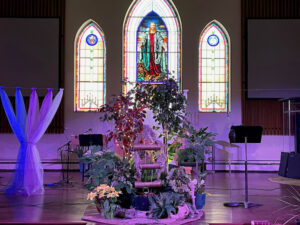Sunbeams are amazing. For some reason, I can remember countless times, from my early childhood, noticing sunbeams seeming to dance in the air as they reflected off particles in the air. But have you ever tried to catch a sunbeam? Cats can tell you that sunbeams are elusive.
The sunbeam that we see is an illusion, yet rays of light coming from the sun are as real as you and me. We’re just not set up to catch them. And neither are cats.
Sunbeams contain energy. When they strike our body, we feel heat as the energy contained in the sunbeam converts into heat. The technical details of what happens to sunbeams are beyond our scope here. But sunbeams matter a great deal to you and me.
Scientists have discovered that the physical world is amazingly complex. The interactions of a sunbeam, for example, involve a symphony of interactions between molecules that make up the physical world as we experience it. Life is often described as a symphony with countless sources of vibration, each with its own sound and contribution to the whole.
Do you know who can catch a sunbeam? Plants are uniquely designed to catch sunbeams.
In the creation story found in the first chapter of Genesis, we read that God declared that the land sprout with vegetation. This included every sort of seed-bearing plant and trees that grow seed-bearing fruit. And that the seeds coming from these plants will, in turn, produce the kinds of plants and trees from which they came (Genesis 1:11). And the plants God created are sunbeam catchers.
But God didn’t end there. God also made all sorts of wild animals, livestock, and small animals, each able to produce offspring of the same kind (Genesis 1:25). And like a master craftsperson proud of their work, God declared that it was good with each part of the material world God created.
While animals don’t catch sunbeams any better than humans, they play an essential supporting role to plants.
But God didn’t stop with plants and animals. God created humankind as caretakers for creation. Not just one human, however. God provided the first human with a workmate — a partner to help care for creation. And in the living world, babies are born, people die, and the cycle of life, death, and new life continue for as long as there is sustenance available to sustain life.
In explaining the significance of His impending death, Jesus used a grain of wheat as a metaphor. He said that a grain remains no more than a single grain unless it is dropped into the ground and dies. If it does die, then it produces many grains (John 12:24). This is the cycle of life. This is the carbon cycle. And all living things participate in this cycle whether or not we acknowledge our role — even when we try to ignore our own impending death.
And because we lived, life continues whether we participated in birthing children. Whether or not we plant a garden. Life comes out of death which never has the last word. This is the promise made by Jesus Christ.
Humans have a special place in the carbon cycle. While our physical bodies eventually return to the stardust we’re made from — our spirit never dies. Jesus promised that all who follow Him will be with God forever. This is the afterlife. And Jesus died to make this the truth and the reality.
Life takes work. These are the rules. Any head of household can tell you that sustenance takes work. Whether you’re putting together a family meal or waiting in line at your favorite drive-through, a lot of our time is taken up in assuring that our bodies receive nourishment.
A grain of wheat remains no more than a single grain unless it is dropped into the ground and dies. If it does die, then it produces many grains.
John 12:24
The Theology of Work Bible Commentary refers to work as a divine calling.2 But what does it mean that work is a sacred calling? For one, it means that a farmer doesn’t work simply to earn a living. Instead, a farmer carefully prepares the soil, places the seeds, and waters the plants because this is part of the farmer’s identity. This is who she is in large part.
Likewise, animals have a divine calling. But there is the elephant in the room that lawyers suggest we don’t name. Since I don’t have a lawyer to advise me, I’ll just blurt it out — Animals have a purpose other than a role in cheap HAPPY MEALS!® There! — I said it. Notice the “R in a circle?” I included this for legal reasons. Someone owns this label. I’ll get back to meals that make us happy later.
All vocations are divine callings in one way or another. This is why many of the jobs we accept aren’t fulfilling. The job is just a paycheck and nothing more. Yet, because God created work for us to do and created us to do work, even the most mundane, thankless job is a form of worship that glorifies God.
Work, such as farming, brings us in direct contact with the physical world. We can feel, taste, and smell the soil. A prick from a thorn leaves a mark. God created the physical world and put us in charge of its well-being. The material world provides the air, food, and water that we need for survival. The material world also provides opportunities for expression and abundance that are much more than sustenance.
Joel Salatin, in his book, The Marvelous Pigness of Pigs, invites us to consider whether what we claim to believe matches our choices for food. What goes into our selection of whether we offer a salad or a Happy Meal® to our children? Can scripture help us make decisions that are more in line with what we believe God expects from us?
One of my most difficult struggles is using food for comfort. I eat when I’m anxious. And I’m anxious a lot. As a result, I am in a constant state of being overweight, despite my extensive collection of diet books. My doctor told me to write down everything I eat along with the caloric content. And when I reach the number of calories my body requires, stop eating.
But what if my body already has energy stored in the pantry? Then I need to ingest fewer calories for a while so my body can use up the reserve. This is called a diet. A 4-letter word that makes me cringe but may also allow me to live years longer than otherwise.
 But our series, Living water, is not about dieting. In many ways, our primary topics are the opposite of dieting. Over the next six weeks, we explore God’s abundance and our role in its equitable use and distribution. Using God’s rules for justice and not rules we make up as we go that benefit a few at the sacrifice of the rest of us.
But our series, Living water, is not about dieting. In many ways, our primary topics are the opposite of dieting. Over the next six weeks, we explore God’s abundance and our role in its equitable use and distribution. Using God’s rules for justice and not rules we make up as we go that benefit a few at the sacrifice of the rest of us.
We begin our new series this Sunday. Our primary subject matter is food. How we grow it, where we get our food, and how we treat creation in the process. Be sure to request your copy of Joel Salatin’s book. 2 And join us each Wednesday at Noon for Book Club and each Sunday at 10:30 am for New Beginnings.
We have a new button on the homepage of our website – Click here to watch. This button takes you to a viewer to allow you to join live or watch later in the week. We’re also live on Facebook and our newly launched YouTube channel. You can find these links along with more information about us on our website at FlintAsbury.org.
A reminder that we publish this newsletter that we call the Circuit Rider each week. You can request this publication by email. Send a request to info@FlintAsbury.org or let us know when you send a message through our website. We post an archive of past editions on our website under the tab, Connect – choose Newsletters.
Pastor Tommy
1 Most of the content for our series comes from: Joel Salatin. The Marvelous Pigness of Pigs: Respecting and Caring for All God’s Creation. New York: FaithWords, a Division of Hachette Book Group, 2016.
2 Theology of Work Bible Commentary. © 2015, 2016 Theology of Work Project. Peabody, MA: Henderson Publishers, 2020.

